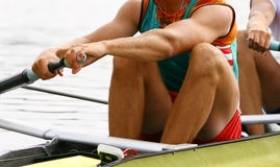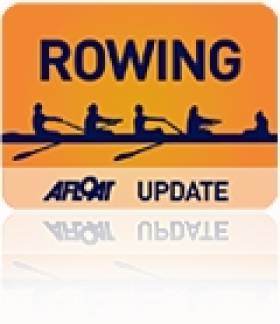Displaying items by tag: Rowing Championships
#Rowing: Skibbereen took two of the three senior titles on offer in the evening session of the second day of the Irish Rowing Championships at the National Rowing Centre. The women's pair of Denise Walsh and Aoife Casey beat UCC, while the men's quadruple held off a late charge by a Queen's/Portadown composite.
Monika Dukarska of Killorglin won the women's senior single. She was dominant all the way, with only Siobhan McCrohan of Tribesmen testing her to any degree.
The junior women's eight gave Cork Boat Club a chance to impress. They led for most of the race, and while Bann held an overlap through the middle of the course, Cork were clear winners.
Trinity were extraordinarily dominant in the men's novice eight - their win by 11 seconds was cheered lustily by their fans.
Shandon fought through the opposition offered by Carlow to win the junior men's quadruple, and Roisin Maguire of Queen's was the best club single sculler.
The man of the day was, arguably, the Clonmel competitor Daire Lynch. The teenager added the men's intermediate single scull to the club title he had won earlier in the day. He passed Declan O'Connor of St Michael's in the middle stages of the race and won well.
Irish Rowing Championships, National Rowing Centre, Cork
Day Two (Selected results)
Men
Eight - Intermediate: Commercial 5:43.182. Novice: Trinity 6:00.157.
Four - Junior, coxed: 1 Cork A 6:29.20, 2 Portora 6:35.341, 3 Clonmel 6:40.716.
Pair - Senior: 1 Skibbereen 6:30.311, 2 UCD 6:33.546, 3 Portora 6:44.968.
Sculling, Quadruple - Senior: 1 Skibbereen 5:59.102, 2 Queen's/Portadown 5:59.790, 3 Shandon A 6:08.509. Junior: 1 Shandon 6:07.970, 2 Carlow B 6:13.361, 3 Three Castles 6:13.799.
Single - Inter: Clonmel (D Lynch) 7:04.573. Club: Clonmel (D Lynch) 7:15.463.
Women
Eight - Novice: Trinity 7:09.594. Junior: 1 Cork 1 Cork 6:39.271, 2 Bann 6:44.193, 3 Portora 6:49.287.
Pair - Senior: 1 Skibbereen 7:23.775, 2 UCC 7:29.369, 3 Trinity 7:46.166.
Sculling, Double - Inter: Lee 7:22.252.
Single - Senior: 1 Killorglin (M Dukarska) 7:35.069, 2 Tribesmen (S McCrohan) 7:50.320, 3 Skibbereen (O Hayes) 7:57.742. Club: Queen's (R Maguire) 8:15.155. Junior: 1 Skibbereen (E Hegarty) 8:05.674, 2 Neptune (C Feerick) 8:13.065, 3 Castleconnell (J Vascotto) 8:15.002.
Irish University Championships Will Go Ahead
#Rowing: The University Championships of Ireland at the National Rowing Centre tomorrow, Friday, are set to go ahead. The organisers may alter the schedule to concentrate on the bigger boats, depending on the weather on the day. There has been strong interest in the event, with 140 entries made.
Irish Rowing Championships Gets Underway in Cork Tomorrow
This Friday the premier event of the domestic rowing season, the Irish Rowing Championship, takes place at the National Rowing Centre in Cork. Over 1200 rowers will compete over two days of racing, the highlight being the Senior Eight or ‘Big Pot’, race on Saturday afternoon.
This year the Championships are split into two events in July and September. The July championships features the big boats, the eights and fours while the singles, doubles and quads will be held in September.
“This is the first year of the new format and it is designed to allow crews to focus on two events. It will also encourage rowing in smaller boats over the summer months which should help raise standards”, claimed Rowing Ireland CEO, Martin Corcoran. He added, “The events for this weekend are eights and fours for men and women in junior, novice, intermediate and senior. There are also sculling and quad events for the under 14, 15 and 16 rowers”.
But it is the premier trophy event, the Senior Eight or Big Pot which the top clubs vie for. This year’s Senior Eight form clubs are NUIG, Queen’s Belfast, Muckross, Killarney, St. Michaels, Limerick and a UCD/Commercial composite crew. The composite crew will include the UCD four who won at Henley together with Olympian Sean Jacob along with Commercial’s, Colm Dowling, Dan Murphy and Frank Folan.
Last year’s race produced a close finish with reigning champions NUIG, whose crew this year includes Beijing Olympian Cormac Folan along with Alan Martin and James Wall, winning by a mere canvas ahead of Queens University. Queens University have had a great season being unbeaten in Ireland and winning the British University Championship. Another form crew are Muckross of Killarney who beat NUIG in the eights at the Metro Regatta last month.
The fours race has a similar line up with the addition of Cork BC and a Commercial/Skibbereen composite. It will be a difficult to predict a winner here as NUIG are reigning champions while Commercial have beaten them this year and UCD won at Henley.
The women’s senior eights race has an interesting composite crew consisting of seven clubs - St Michaels, University of Limerick, Carrick on Shannon, Killorglin, City of Derry, Skibbereen and Cork BC. The crew includes a serious line-up of single scullers who were part of the international team trials and includes Dympna Kelly, Carrick, Sheila Clavin, St. Michael’s, Orla Hayes, Skibbereen and Monika Dukarska, Killorglin.
There is a massive entry for Junior 14, 15 and 16 boys and girls with thirty two scullers entered in the boys under 16 race. Over 300 crews will compete over two days in a range of categories and with record entry levels, it promises two days of action packed racing. The championships take place at the National Rowing Centre in Farran Wood, Iniscarra, Co Cork on Fri 16th and Sat 17th July from 8am to 5pm each day.
Note: The Championships have a long tradition as an All-Ireland event with the first one taking place nearly one hundred years ago at the Dublin Metropolitan Regatta in Ringsend in 1912. The top clubs winning across all categories since the inaugural event are Dublin clubs Neptune (149) and Commercial (133), Skibbereen (109), UCD (81), Garda Siochána ((72) and NUI Galway (56).
The annual event takes place at the National Rowing Centre, Cork. The centre, opened in 2007, is the sport’s high performance headquarters. An indication of the state of the art facilities on offer is the number of top rowing nations that have expressed interest in using the centre for training camps in the run-up to the 2012 Olympics.

Click this link for the Latest Rowing News
































































